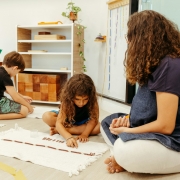Top Reasons Why Play-Based Learning Rocks
Play-based learning is a fantastic way for kids to learn and grow. It turns everyday activities into valuable learning experiences. Instead of sitting still and listening, children actively engage with their surroundings and make sense of the world through play. This hands-on approach helps kids absorb and retain information much better than traditional methods.
What makes play-based learning so effective is its natural connection to how children explore and understand new concepts. When kids play, they experiment, solve problems, and stretch their creativity. They learn to think critically and make decisions, all while having fun. It’s a way of learning that feels less like work and more like an adventure.
This type of learning also focuses on the child’s interests. When educators tailor activities to what kids are curious about, learning becomes exciting and meaningful. Children stay motivated and enthusiastic, eager to discover more. By making learning enjoyable, play-based methods help instil a love for learning that can last a lifetime.
Enhances Cognitive Development
Boosts Problem-Solving Skills
Play-based learning is excellent for boosting problem-solving skills. When children engage in activities like puzzles or building blocks, they face challenges that require creative solutions. They think about how pieces fit together, what might be missing, and how to achieve a specific goal. These activities help kids learn to analyse situations and develop strategies to solve problems. This hands-on experience is vital for cognitive development and equips children with the skills they need for real-life situations.
Another great example is role-playing games. When kids pretend to be different characters, they often encounter scenarios that require quick thinking and decision making. Whether it’s resolving a pretend dispute or figuring out how to build a fort, these moments of problem-solving enhance their cognitive abilities in a fun and engaging manner.
Encourages Creativity and Critical Thinking
Play also encourages creativity and critical thinking in many ways. Activities like drawing, storytelling, and building imaginative worlds help children express their ideas and explore new concepts. Kids learn to think outside the box, seeing things from different perspectives. When children are allowed to use their imagination, they develop the ability to create and innovate, which is crucial for cognitive growth.
Critical thinking is another benefit of play-based learning. Through play, kids learn to evaluate situations, ask questions, and think logically. Games that involve patterns, sequences, or strategy help children develop these skills. For example, when playing a game like chess, kids anticipate their opponent’s moves and plan their strategy accordingly. Such activities sharpen their critical thinking abilities and prepare them for more complex tasks in the future.
Supports Emotional and Social Growth
Builds Emotional Intelligence
Play-based learning helps build emotional intelligence in children. When kids play, they deal with various emotions like excitement, frustration, and joy. They learn to manage these feelings in a safe and supportive environment. Activities that involve taking turns, winning, and losing teach kids about empathy and understanding others’ emotions. These experiences help children develop self-awareness and emotional regulation, which are essential life skills.
Emotional intelligence is also fostered through pretend play. When children take on different roles, they practice seeing the world from another person’s perspective. This role-playing helps them understand how others feel and react in different situations. Developing this ability to empathise makes them more compassionate and better at forming healthy relationships.
Promotes Teamwork and Communication Skills
Social play naturally promotes teamwork and communication skills. When children engage in group activities, they learn how to collaborate and share ideas. Games that require teamwork, such as building a group project or playing team sports, teach kids how to work together towards a common goal. These experiences help them understand the importance of cooperation and the role each person plays in achieving success.
Communication skills are also honed through play-based learning. Kids practice speaking and listening as they interact with their peers. Activities like storytelling, group discussions, or even simple games like “Simon Says” help improve verbal and non-verbal communication skills. By explaining their ideas and understanding others, children develop essential communication abilities that will benefit them throughout their lives.
Promotes Physical Development
Improves Fine and Gross Motor Skills
Play-based learning is fantastic for improving both fine and gross motor skills in children. Fine motor skills involve the small muscles in the hands and fingers. Activities like threading beads, drawing, or playing with building blocks help kids develop fine motor control and dexterity. These skills are essential for tasks like writing, cutting with scissors, and buttoning clothes.
Gross motor skills involve the larger muscles used for running, jumping, and climbing. Physical play, such as playing on a playground, riding a bike, or participating in sports, helps children develop muscle strength and coordination. These activities support overall physical health and contribute to a child’s ability to perform everyday activities with ease.
Encourages Healthy, Active Lifestyles
Encouraging a healthy, active lifestyle is another benefit of play-based learning. When children engage in physical play, they develop habits that can lead to an active lifestyle as they grow older. Kids who enjoy physical activities are more likely to prefer staying active and healthy rather than being sedentary.
Moreover, being active helps children manage stress and improve their mood. Physical activities release endorphins, which can boost happiness levels. By making physical play a regular part of their routine, children learn the importance of taking care of their bodies and minds. It’s a great way to ensure they grow up to be healthy, active adults.
Instils a Love for Learning
Makes Learning Enjoyable and Engaging
One of the best things about play-based learning is that it makes learning enjoyable and engaging. When children participate in activities that interest them, they are more likely to stay focused and enthusiastic. Play-based learning turns education into an exciting adventure, making kids eager to discover and learn new things. Activities like interactive games, hands-on projects, and storytelling allow children to experience the joy of learning in a fun way.
This engaging approach helps children associate learning with positive experiences. They see education as something exciting rather than a chore. By making learning enjoyable, play-based methods foster a positive attitude towards education that can last a lifetime.
Encourages Lifelong Curiosity and Exploration
Another key benefit of play-based learning is that it encourages lifelong curiosity and exploration. Children learn to ask questions, seek out answers, and explore their environment. This curiosity-driven approach helps them develop a love for learning that extends beyond the classroom. They become independent thinkers and learners, always looking for new information and experiences.
When educators support children’s natural curiosity, they help build a foundation for lifelong learning. Kids develop the confidence to explore new subjects and persist in the face of challenges. This mindset sets them up for success in school and life, as they continue to seek knowledge and grow.
Conclusion
Play-based learning offers countless benefits that help children grow in many areas. From cognitive and emotional development to physical skills and a love for learning, play provides a rich and engaging way for kids to learn. At Eskay Kids, we believe that making learning fun and meaningful is the key to fostering well-rounded, curious, and happy children.
Our play-based approach ensures that children receive a well-rounded education that supports their overall development. We create a nurturing environment where kids can explore, play, and learn at their own pace. This approach helps them build the skills and confidence they need to succeed in the future.
Are you ready to give your child the best start? Discover how Eskay Kids can make learning a joyful and enriching experience for your little one. Visit our website to learn more and enrol today!




